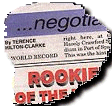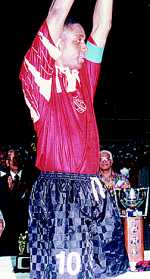


- the differing factors
©copyright 1998
by Terence Hilton Clarke
![]()
Jamaica's outstanding performance at the just concluded CONCACAF Golf Cup in the USA, was yet another example of the dramatic progress made by that country's national team since the arrival of technical director, René Simoes in 1995. Ove the last three years, the Jamaicans have gone from strength to strength and, for the moment, actually seem to be improving with each game.
As pointed out a few months ago, Trinidad & Tobago's 4-0 victory over Jamaica in a CFU Nation's Cup qualifier in Arima, back in June 1981, is a long time back in more ways than one. Jamaica are now steam rolling toward this summer's World Cup in France; Trinidad and Tobago has only just begun its quest to recapture the days of old. While Jamaica eagerly seeks to match skills with Argentina, Croatia and Japan, Trinidad and Tobago will be aiming to win a fifth consecutive title in the Caribbean Cup - a competition which the Jamaicans eschewed a long time ago in favour of pursuing greater international soccer glory.

Russell Latapy- T&T
While there has been the obvious acquisition of technical expertise under Simoes, what has helped Jamaica in its mission are the traditional qualities of patriotism, determination and commitment which have spurred the national team on to playing to the best of its ability. It is this penchant that has now made Jamaica a very dangerous team to play. For example, in the two games against Brazil the Jamaicans were definitely second best. However, at no point did René Simoes' team relent from assaulting the Brazilian defence with its dangerous counter-attacks and, in the third-place match, pressured the Brazilians to the point that they almost got a late equalizer.
Unless there is a dramatic loss in form, Jamaica are going to at least give each of its World Cup Group H opponents a run for their money. Any team that underestimates Jamaica, will do so at its own peril.
By contrast, such qualities have not always been possessed by Trinidad and Tobago. Some of this country's athletes and teams have been known to collapse under pressure, while others have been simply overawed by the occasion. While it may be unfair to accuse Trinidadians of being unpatriotic, there has been an obvious lack of commitment to the national cause.
Why is this so? Why do we give up so easily? Why do certain people agree to place club before country, while others jump at the chance to represent their nation?

Deon Burton-Jamaica
Unfortunately, such questions only serve to raise further enquiries: Why are our sportsmen frequently under prepared for international competition? Why is Trinidad and Tobago falling behind in football, track and field, basketball and net ball? Why are there no Russell Latapys, Ato Boldons or Brian Laras on the horizon? Why have no development programmes been formulated as yet? The partial answer to these questions is attitude. Attitude to sports has marked a major difference between Trinidad and Tobago and Jamaica. Here the national value of sporting achievement is never capitalized upon, just exploited. While we revel in the immediate successes of Crawford, Noel, Stewart, Lara and Boldon, we fail to lay down the mechanisms to ensure that we continue to produce sporting heroes on a frequent basis. The last five or six years have seen plenty talk but little action.
Jamaica is different. Physical education in primary schools (referred to as "sports") is mandatory and taken very seriously. Schools athletics competition is extremely important and Jamaica's yearly dominance of the Junior Carifta Games is a constant indicator that the legacy of Wint, Quarrie, Cameron and Ottey will never be allowed to die.

Peter Cargill- Jamaica ( left )
As explained in an article back in The Independent of November 22, last year, Trinidad and Tobago has now been relegated to the position whereby it must seek to follow Jamaica as an example. For it is in Jamaica that sport development is a priority, where the determination to succeed is part and parcel of the national psyche, where both the government and the business sectors contribute readily in the name of national sporting interest - where the prospect of waiting 20 years for an Ato Boldon to appear by chance is simply not accepted.
go back up| More
Sports with other sports articles divided in categories
|




